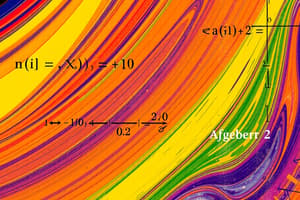Podcast
Questions and Answers
What operations on functions should learners be able to perform by the end of the lesson?
What operations on functions should learners be able to perform by the end of the lesson?
Addition, subtraction, multiplication, division, and composition of functions.
What is the toll fee during the day?
What is the toll fee during the day?
$1
What is the toll fee at night?
What is the toll fee at night?
$2
What is the admission fee for visitors aged 2 years or younger?
What is the admission fee for visitors aged 2 years or younger?
What is the admission fee for visitors older than 2 years?
What is the admission fee for visitors older than 2 years?
How much does a parking lot charge for the first hour?
How much does a parking lot charge for the first hour?
How much does the parking lot charge for each additional hour?
How much does the parking lot charge for each additional hour?
What is the flat rate charged by the water utility company for up to 500 gallons?
What is the flat rate charged by the water utility company for up to 500 gallons?
What is the additional charge per gallon for water used beyond 500 gallons?
What is the additional charge per gallon for water used beyond 500 gallons?
If Jen stays for 4 hours in the parking lot, what is her total charge?
If Jen stays for 4 hours in the parking lot, what is her total charge?
If Cara stays for 7 hours in the parking lot, what is her total charge?
If Cara stays for 7 hours in the parking lot, what is her total charge?
If Jen travels for 500 gallons of water, what is her total cost?
If Jen travels for 500 gallons of water, what is her total cost?
If Cara travels for 600 gallons of water, what is her total cost?
If Cara travels for 600 gallons of water, what is her total cost?
Flashcards are hidden until you start studying
Study Notes
Operations on Functions
- Addition, subtraction, multiplication, division, and composition are the main operations performed on functions.
- Understanding how to manipulate functions is essential for problem-solving in mathematics.
Toll Road Fees
- Daytime toll fee: $1 (6 AM to 6 PM).
- Nighttime toll fee: $2 (6 PM to 6 AM).
- Function representation: Let 𝐶(𝑥) represent the toll fee, where 𝑥 is the hour (0-23).
Zoo Admission Fees
- Admission fee for children aged 2 years or younger: $3.
- Admission fee for visitors older than 2 years: $7.
- Function representation: Let 𝐶(𝑥) represent the admission fee, where 𝑥 is the visitor's age.
Parking Lot Charges
- Cost for the first hour: $5.
- Additional hours cost: $3 per hour.
- Function representation: Let 𝐶(𝑥) represent the total cost, where 𝑥 is the number of hours parked.
- Example scenarios:
- Jen parks for 4 hours.
- Cara parks for 7 hours.
Water Utility Costs
- Flat rate for up to 500 gallons: $30.
- Additional charge for usage over 500 gallons: $0.05 for each gallon beyond 500.
- Function representation: Let 𝐶(𝑥) represent the total cost, where 𝑥 is the number of gallons used.
- Example scenarios:
- Jen uses 500 gallons, incurring a total fee of $30.
- Cara uses 600 gallons, incurring an additional charge for the excess.
Conclusion
- These examples illustrate how to construct functions based on real-world scenarios and apply operational functions to derive costs and fees.
Studying That Suits You
Use AI to generate personalized quizzes and flashcards to suit your learning preferences.




